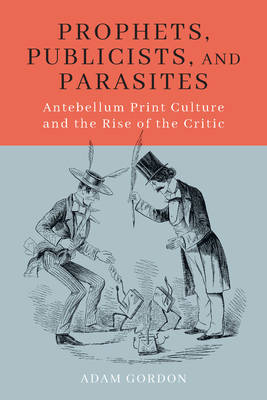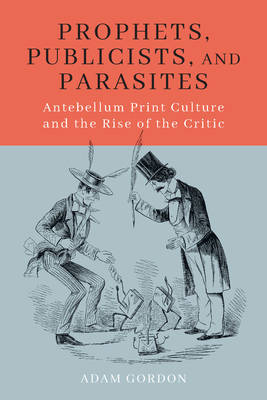
Door een staking bij bpost kan je online bestelling op dit moment iets langer onderweg zijn dan voorzien. Dringend iets nodig? Onze winkels ontvangen jou met open armen!
- Afhalen na 1 uur in een winkel met voorraad
- Gratis thuislevering in België vanaf € 30
- Ruim aanbod met 7 miljoen producten
Door een staking bij bpost kan je online bestelling op dit moment iets langer onderweg zijn dan voorzien. Dringend iets nodig? Onze winkels ontvangen jou met open armen!
- Afhalen na 1 uur in een winkel met voorraad
- Gratis thuislevering in België vanaf € 30
- Ruim aanbod met 7 miljoen producten
Zoeken
Prophets, Publicists, and Parasites
Antebellum Print Culture and the Rise of the Critic
Adam Gordon
Hardcover | Engels
€ 117,95
+ 235 punten
Uitvoering
Omschrijving
Print culture expanded significantly in the nineteenth century due to new print technologies and more efficient distribution methods, providing literary critics, who were alternately celebrated and reviled, with an ever-increasing number of venues to publish their work. Adam Gordon embraces the multiplicity of critique in the period from 1830 to 1860 by exploring the critical forms that emerged. Prophets, Publicists, and Parasites is organized around these sometimes chaotic and often generative forms and their most famous practitioners: Edgar Allan Poe and the magazine review; Ralph Waldo Emerson and the quarterly essay; Rufus Wilmot Griswold and the literary anthology; Margaret Fuller and the newspaper book review; and Frederick Douglass's editorial repurposing of criticism from other sources. Revealing the many and frequently competing uses of criticism beyond evaluation and aesthetics, this insightful study offers a new vision of antebellum criticism, a new model of critical history, and a powerful argument for the centrality of literary criticism to modern life.
Specificaties
Betrokkenen
- Auteur(s):
- Uitgeverij:
Inhoud
- Aantal bladzijden:
- 280
- Taal:
- Engels
Eigenschappen
- Productcode (EAN):
- 9781625344526
- Verschijningsdatum:
- 13/02/2020
- Uitvoering:
- Hardcover
- Formaat:
- Genaaid
- Afmetingen:
- 157 mm x 229 mm
- Gewicht:
- 566 g

Alleen bij Standaard Boekhandel
+ 235 punten op je klantenkaart van Standaard Boekhandel
Beoordelingen
We publiceren alleen reviews die voldoen aan de voorwaarden voor reviews. Bekijk onze voorwaarden voor reviews.











